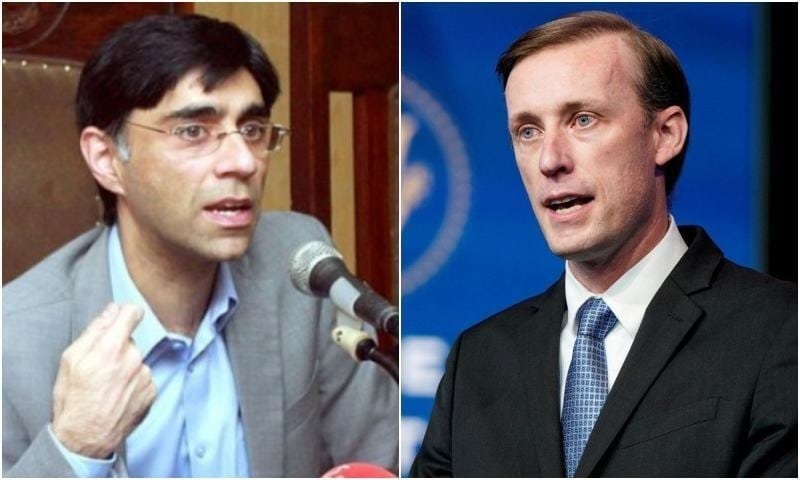Pakistan and the US’s national security advisors met in Washington on Thursday to discuss the “urgent need for reduction in violence and a negotiated political settlement in Afghanistan”.
NSA Moeed Yusuf and his American counterpart Jake Sullivan did not disclose their meeting until Thursday evening, when they sent short tweets saying that they discussed other topics of common interest.
The two officials met for the second time after meeting in Geneva in March.
“Had a positive follow-up meeting with NSA Jake Sullivan today in Washington,” Yusuf said in his tweet. “Took stock of progress made since our Geneva meeting and discussed bilateral, regional and global issues of mutual interest.”
Yusuf also said that the two sides “agreed to sustain the momentum in Pak-US bilateral cooperation”.
Had a positive follow-up meeting with NSA @JakeSullivan46 today in Washington. Took stock of progress made since our Geneva meeting & discussed bilateral, regional and global issues of mutual interest. Agreed to sustain the momentum in Pak-US bilateral cooperation.
— Moeed W. Yusuf (@YusufMoeed) July 30, 2021
Sullivan dedicated half of his tweet on the Afghan problem, while not mentioning Afghanistan among the topics addressed in the meeting.
“I met with Pakistan’s NSA today to consult on regional connectivity and security, and other areas of mutual cooperation,” he said.
I met with Pakistan’s NSA today to consult on regional connectivity and security, and other areas of mutual cooperation. We discussed the urgent need for a reduction in violence in Afghanistan and a negotiated political settlement to the conflict.
— Jake Sullivan (@JakeSullivan46) July 30, 2021
“We discussed the urgent need for a reduction in violence in Afghanistan and a negotiated political settlement to the conflict.”
Since the Biden administration entered office, the icebreaker in Geneva was the first high-level physical encounter between the two countries.
Before the Geneva conference, US State Secretary Antony Blinken met with Foreign Minister Shah Mahmood Qureshi and Army Chief Gen Qamar Bajwa twice. General Bajwa has also been in contact with US Defense Secretary Lloyd Austin.
On Thursday, US Secretary of State Antony Blinken said that Pakistan has a critical role in influencing the Taliban, and that the US expects Islamabad will play that role.
Secretary Blinken made these comments in an interview with different foreign news networks, came as Pakistan’s National Security Adviser Moeed Yusuf and Director General of Inter-Services Intelligence, Lt. Gen. Faiz Hameed, pay a crucial visit to Washington.
“Pakistan has a vital role to play in using its influence with the Taliban to do whatever it can to make sure that the Taliban does not seek to take the country by force,” the top US diplomat told the Times of India channel. “And it does have influence, and it does have a role to play, and we hope that it plays it,” he added.
Secretary Blinken met with External Affairs Minister Dr. S. Jaishankar and Prime Minister Narendra Modi in New Delhi on Thursday to wrap off his two-day visit to India. They discussed the current events in the region, especially in Afghanistan.
Secretary Blinken told ABC News that the entire world is hearing “deeply, deeply troubling” tales of crimes in Afghanistan as the US withdraws.
In an interview to Al Jazeera, the US Secretary of State warned that an Afghanistan that “does not respect the basic gains of the last 20 years, that Afghanistan will be a pariah in the international community.
The interviews, which were made public by the US secretary of state’s office in Washington, show increasing US concerns that the Taliban were intent to seize Kabul by force, rejecting international attempts to form a government that included all Afghan groups.
Despite its commitment to remove all US and Nato forces from Afghanistan by September 15, the Biden administration is using its diplomatic clout to avoid a Taliban takeover, and it sees Pakistan playing a role in this.
While Pakistan likewise wants to avoid a military takeover in Kabul, Prime Minister Imran Khan said this week on PBS News Hour that the United States’ decision to establish a timeline for troop withdrawal has restricted Islamabad’s choices.
The Taliban view the retreat as a triumph, according to the prime minister, and are less open to peace attempts than they would have been if the timeline had not been published.
The Pakistani delegation, which arrived in Washington three days ago, is busy presenting its case to top US officials, legislators, think-tank experts, and journalists.










